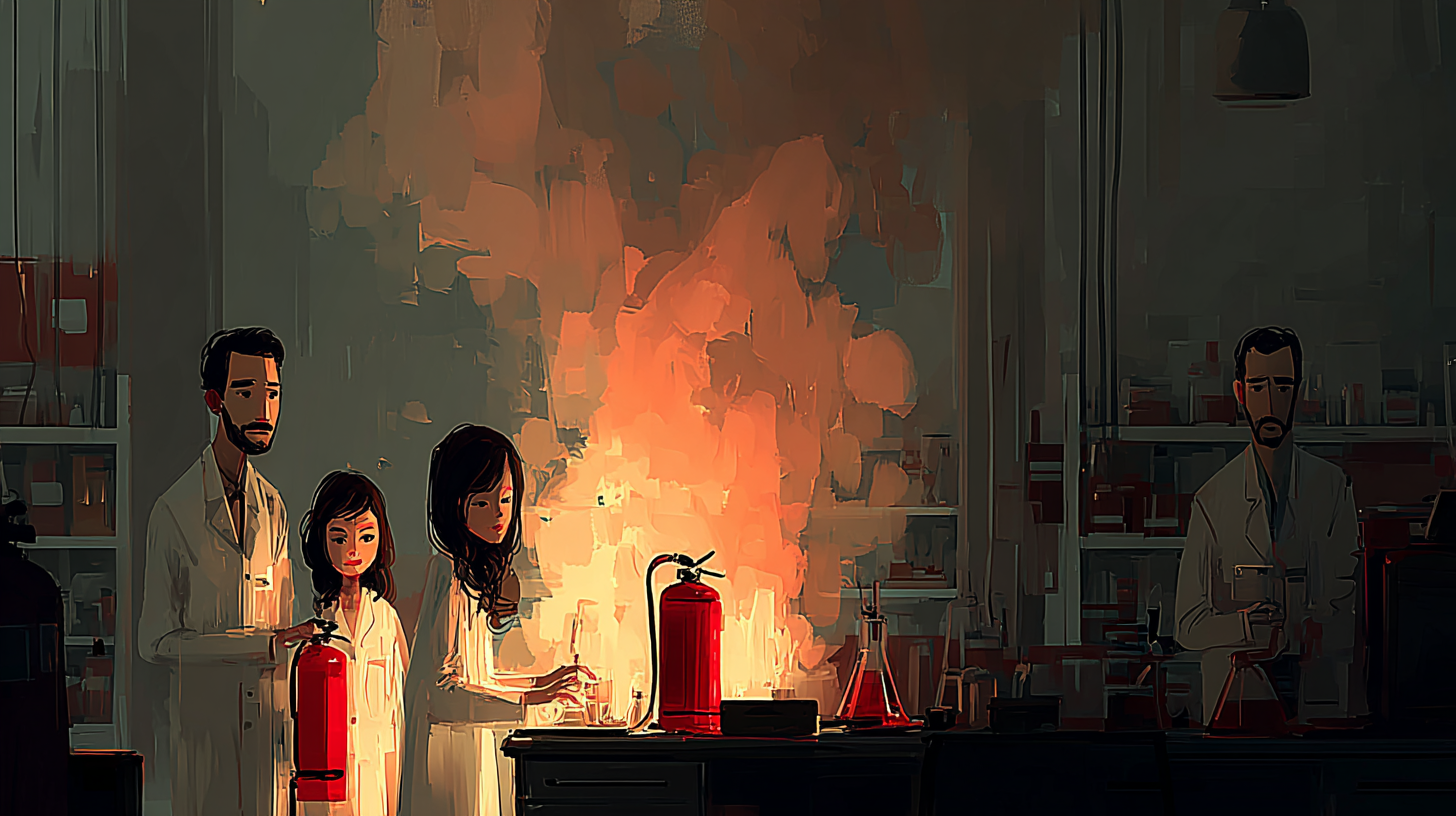To break apart loudly or suddenly, or to show a sudden strong emotion.
爆発する、急に大きな音や力で壊れる。感情が急に表に出ることもある。
以下は英単語 “explode” に関するストーリー型学習コンテンツです。まずは大枠の意味を理解して最後の文章で確認しましょう。
「explode」の主な意味(main meaning)
| 品詞 (POS) | 発音 (IPA) | 簡潔な定義(英語) | 例文(英語) |
|---|---|---|---|
| verb (intransitive) | /ɪkˈsploʊd/ | to break apart or come out suddenly and violently, often with a loud noise | The old tire exploded on the highway. |
| verb (intransitive, figurative) | /ɪkˈsploʊd/ | to show a sudden strong emotion or reaction | When she heard the news, she exploded with joy. |
| verb (transitive, less common) | /ɪkˈsploʊd/ | to cause something to burst or be destroyed by a strong force | The engineer accidentally exploded the test device. |
「explode」の語源(etymology)
「explode」はラテン語の explodere(ex- 「外へ」+plaudere/plaud- 「打つ、叩く」に由来)から来ました。元のイメージは「打ち出す」や「外に押し出す」という動きです。現在の意味は「破裂して中から外へ出る」という感覚につながっています。
「explode」の類義語(synonyms)
| 類義語 (Synonym) | 例文(英語) |
|---|---|
| burst | The pipe burst and water filled the room. |
| erupt | Anger erupted when the meeting ended. |
| detonate | The technicians detonate the old device in a safe area. |
| blow up | The picture blew up into a giant poster for the event. |
| shatter | The vase shatter(ed) when it hit the floor. |
「explode」の反義語(antonyms)
| 反義語 (Antonym) | 例文(英語) |
|---|---|
| implode | The old structure imploded during the controlled demolition. |
| calm (down) | He calmed down after the manager explained the plan. |
「explode」のコロケーション(collocations)
| コロケーション (Collocation) | 例文(英語) |
|---|---|
| explode with anger | He nearly exploded with anger when he saw the mistake. |
| explode into laughter/cheers | The room exploded into laughter after the joke. |
| detonate a bomb / detonate a device | The squad safely detonated the device in the field. |
| explode suddenly | Sales exploded suddenly after the advertisement ran. |
「explode」の2項表現(binomials)
| 2項表現 (Binomial) | 例文(英語) |
|---|---|
| boom and bust | The startup experienced a boom and bust in its first three years. |
| rise and fall | The rise and fall of the product’s popularity surprised everyone. |
英語ストーリー(english story)
It was a normal Monday morning at the small product design office. Maya, a junior engineer, was testing a prototype battery in the lab. She watched the screen carefully because last week a similar unit had burst when it overheated. The team had warned her: “If the temperature goes above the limit, stop the test immediately.”
At 10:15 a.m., a sudden alarm flashed. The battery began to smoke and then erupt in a small flame. Maya hit the emergency switch and yelled for help. The lab’s safety officer rushed in and used the extinguisher. The room did not explode, but the noise and the flash were frightening. Later the team learned that an old sensor had failed and the device would have detonated if it had been in a full test chamber.
After the incident, the office gathered in the meeting room. The manager explained the cause and the safety steps. Tension ran high; some members nearly exploded with anger at the idea that a small mistake could cause so much trouble. Others tried to stay calm. Tom, the senior engineer, said, “We will fix the sensor and change our schedule. This is not a boom and bust moment—we can learn and move on.”
To lower the stress, Mariko told a short joke about a robot that tried to make coffee. The atmosphere exploded into laughter, and even Maya smiled. The team wrote a clear checklist and scheduled a full review. They also agreed to run smaller trials before the full test, so a problem would not cause a dangerous reaction again.
Two weeks later, the improved prototype passed the safe tests. The team celebrated the rise and fall of their worry: first it rose high, then it slowly fell as they fixed the problem. Maya felt proud. She remembered the words from training: “When something dangerous happens, don’t panic; follow the steps, and ask for help.” That day she realized how fast a small error can become serious, and how calm action can stop danger before it becomes an explosion.
At the next company meeting, the manager used the incident as an example of responsibility. “We avoided a disaster because we reacted quickly. We fixed the sensor and redesigned the testing schedule. This shows how we can recover from a possible burst event if we work together.” The team agreed, and they returned to their desks with a new respect for safety and for each other.
和訳
職場の小さな製品設計事務所で、いつもの月曜日の朝だった。ジュニア技術者のマヤは研究所で試作のバッテリーをテストしていた。先週、似たユニットが過熱して**burst(burst:破裂する)**したので、彼女は画面を注意深く見ていた。チームは「温度が限界を超えたらすぐにテストを止めて」と注意していた。
10時15分、突然アラームが点滅した。バッテリーが煙を出し、やがて小さな炎で**erupt(erupt:噴き出す、爆発的に起こる)した。マヤは非常スイッチを押して助けを呼んだ。研究所の安全担当が駆けつけ消火器を使った。部屋はexplode(explode:爆発する)しなかったが、音と閃光は恐ろしかった。後でチームは、古いセンサーが故障し、本格的な試験室にあったら装置がdetonate(detonate:爆発させる)**していた可能性があると知った。
事故の後、事務所は会議室に集まった。マネージャーが原因と安全対策を説明した。緊張が高まり、あるメンバーは小さなミスで多くの問題が起きることに**explode with anger(explode with anger:怒りで爆発しそうになる)しそうになった。ほかの人は冷静さを保とうとした。チームのシニア技術者のトムは言った。「これはboom and bust(boom and bust:急成長と急降下)**の瞬間ではない — 学んで前に進めるよ。」
ストレスを下げるため、マリコはコーヒーを作ろうとするロボットの短い冗談を話した。雰囲気は**exploded into laughter(exploded into laughter:笑いに爆発した)**し、マヤも微笑んだ。チームは明確なチェックリストを書き、全点検を予定した。また、問題が危険な反応になるのを防ぐために、本格試験の前に小さな試験を行うことにした。
2週間後、改良した試作品は安全試験に合格した。チームは不安の**rise and fall(rise and fall:上昇と下降)を祝い、最初は高く上がった不安が問題を直すことで徐々に下がった。マヤは誇りを感じた。訓練で聞いた言葉を思い出した。「危険なことが起きたらパニックにならず、手順に従い、助けを求めなさい。」その日、彼女は小さな誤りがどれほど速く重大になり得るか、そして冷静な行動がexplosion(explosion:爆発)**になる前に危険を止められることに気づいた。
次の社内会議で、マネージャーはその出来事を責任の例として使った。「迅速に対応したおかげで災害を避けられた。センサーを直し、試験スケジュールを設計し直した。これは**burst(burst:破裂する)**のような事象から協力して回復できることを示している。」チームは同意し、安全と互いへの敬意を新たにして机に戻った。
「explode」のQ&A
- Qexplode と burst の違いは何ですか?
- A
「explode」は大きな音や強い力を伴う爆発を指し、感情の爆発にも使われます。「burst」は中身が急に外に飛び出るイメージで、風船やパイプなどが破裂するときによく使います。burst の方が物理的で具体的です。
- Qexplode と erupt の違いは何ですか?
- A
「erupt」は自然現象や感情が激しく出るときに使われ、火山が噴火する、怒りが込み上げるなどの表現に使われます。「explode」は人工物や事故、感情の爆発に広く使われ、より汎用的です。
- Qdetonate と explode はどう違いますか?
- A
「detonate」は「意図的に爆発させる」行為を表します。専門的で軍事・科学分野でよく使われます。「explode」は自然に起こる爆発にも使えるため、より広い文脈で使えます。
- Qimplode は explode の反対ですか?
- A
はい、物理的には「implode(内側に崩れる)」は「explode(外に破裂する)」の反対です。ただし感情や比喩では、「explode」は感情を外に出す、「implode」はそれを内に押し込む、という対比的な使い方もされます。
- Qexplode with anger はどんなときに使いますか?
- A
怒りを抑えきれずに感情が一気に表に出る場面で使います。たとえば、何度も我慢していた人が最後に怒鳴るような状況です。
- Qexplode into laughter はどういう意味ですか?
- A
「急に笑い出す」「場が一気に笑いに包まれる」という意味です。ジョークや出来事が面白すぎて、誰かまたはみんなが爆笑する様子を表します。
- Qdetonate a bomb という表現は日常でも使いますか?
- A
「detonate a bomb(爆弾を爆発させる)」は軍事・警察・ニュースなどの文脈で使います。日常会話では「explode」や「blow up」の方が自然です。
- Qboom and bust はどういうときに使いますか?
- A
景気やビジネスの「急成長(boom)」と「急落(bust)」の流れを表すときに使います。特に経済の周期やスタートアップの浮き沈みに使われます。
- Qrise and fall はどんな意味ですか?
- A
「上昇と下降」「盛衰」という意味です。人気、権力、感情の起伏などに幅広く使われる表現です。
| 単語 | 意味(簡易) | 主な対象 | ニュアンス・違い | 使用例文 |
|---|---|---|---|---|
| explode | 爆発する | 爆弾、感情 | 内圧で爆発/物理・感情の両方に使える | He exploded with anger. |
| burst | 破裂する | 風船、パイプ | 突然の破裂/中から外への破裂 | The balloon burst. |
| erupt | 噴火する | 火山、怒り | 自然現象・激しい噴出(火山・感情)に使う | The volcano erupted. |
| detonate | 爆破する | 爆弾、装置 | 意図的に爆弾を爆破させる/軍事・技術用語 | The bomb was detonated remotely. |



コメント